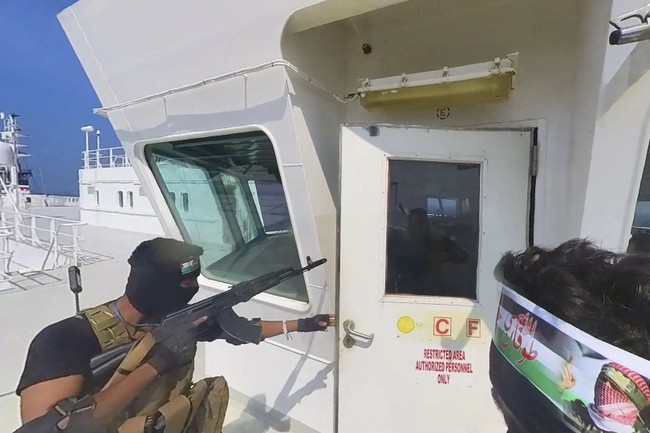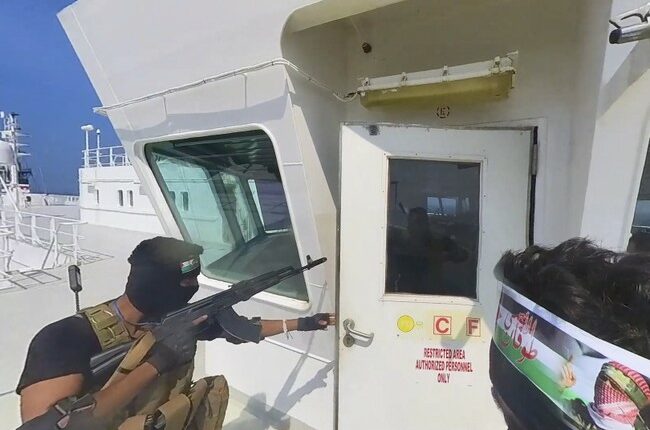
Recent attacks by Yemen’s Houthis on non-American-flagged shipping in the Red Sea have once again raised questions about the security of shipping in a so-called “global world.”
For more than 48 hours, two merchant ships in the Red Sea tried to fight off repeated attacks by Houthi fighters who used rocket-propelled grenades, missiles, and drones to sink them both, kill at least three crew members, and take others hostage. No U.S. or allied warship was around to help.
What navies were supposed to come to their aid? While Biden-era and EU policy was ostensibly to keep the Red Sea open to everyone, the new Trump rules of engagement are only to respond to the Houthis if American ships are attacked. That left only the European task force Aspides to ride to the rescue.
But the EU task force Aspides needs a minimum of 10 naval ships plus land bases to cover the Red Sea, Gulf of Aden, Arabian Sea, Gulf of Oman, Persian Gulf, and northwest Indian Ocean. Only France, Germany, Italy, Greece, and Belgium actually provided a handful of ships to the freedom of navigation mission — and no land bases — while the rest provided only “support staff.” With Aspides’ limited capability, it had no chance of covering its AO and could not sail to the rescue of the two ships, both of which were Greek-owned.
While the U.S. is expected to keep the Red Sea open to everyone for free, others took a narrower view. China escorts “unilateral convoys” of Chinese ships past the danger area. “Chinese state media and a shipping company have reported that China’s navy has begun escorting Chinese cargo ships across the Red Sea.” Chinese ships often broadcast identifiers like “All Chinese” or “Chinese Ship” on their Automatic Identification System (AIS) in the same way some ships broadcast “All Muslim” to avoid Houthi attack.
This has historical precedent. After the American Revolution, the U.S. lost the protection of the Royal Navy, and in the face of attacks by the Barbary states, which attacked Christian nations, including the newly independent country, the U.S. protected its own ships. Hence, the origin of the Marine Corps hymn line, “From the halls of Montezuma to the shores of Tripoli.”
The naval hegemon of the day, Britannia, did not provide free passage for all. Only after the Napoleonic Wars did Britain take a stronger stance against Barbary piracy, with the 1816 Bombardment of Algiers (led by Admiral Edward Pellew) weakening the Barbary states. This was driven by British abolitionist pressure to end the slave trade, which included the Barbary enslavement of Europeans, not by a desire to aid the U.S.
Piracy in the Persian Gulf, Barbary Coast, and Red Sea gradually diminished thanks to a combination of diplomacy and naval technology. British and French colonial control over Egypt, Sudan, and Aden (Yemen) from the late 19th century stabilized the Red Sea. The Suez Canal’s opening (1869) increased European naval presence, with Britain’s Aden Protectorate serving as a base to patrol against piracy. For a time, governance expanded, and the writ of “international law” held increasing sway.
Perhaps most importantly, commercial maritime technology outpaced what was available to pirates – temporarily. Shipping adopted faster, larger vessels equipped with radar and communication systems, making them harder targets for small-scale pirates. For a time, these factors produced relative security.
Then, in the early 20th century, the pendulum swung again. State collapse in the Middle East and North Africa region created power vacuums and rogue regional powers willing to support corsairs. Today, great powers Russia and China support regional power Iran, which in turn supports the Houthis. Technology has also shifted in the Houthis’ favor. Satellite tracking enables the targeting of distant ships with ballistic and cruise missiles, as well as drones. These are advantages that Western navies have yet to completely overcome.
The combination of chaos and new technology, plus its proximity to Europe, has made the region a dangerous place again. Italy and Greece are sounding the alarm: Libya is as great a threat to Europe as Ukraine:
Migrant flows from Libya are spiking again, at a time Rome is increasingly concerned about Russia’s growing influence in the unstable North African nation, wielded through arms supplies and a potential new naval base in the northeastern port of Tobruk.
Right on cue, riots in Spain have broken out over an attack on an elderly Spaniard by Moroccan migrants. Yet it appears that, like Aspides, Europe is constrained by weakness. Prime Minister Pedro Sanchez recently said that he:
…has recently announced plans to make it easier for immigrants to settle in Spain, arguing that Spanish society would suffer if immigration was to be halted: “Almost half of our municipalities are at risk of depopulation. We have elderly people who need a caregiver and can’t find one. Companies that are looking for programmers, technicians, bricklayers and cannot find them. Rural schools that need children so that they don’t have to close their doors.”
But so great is Western complacency that the public is surprised and outraged that history is back. The simple reason the pirates sail the seas is that the relative weakness of Europe has returned. It will not go away until the West regains its confidence.
Editor’s Note: Do you enjoy PJ Media’s conservative reporting that takes on the radical left and woke media? Support our work so that we can continue to bring you the truth. Join PJ Media VIP and use the promo code FIGHT to get 60% off your VIP membership!









